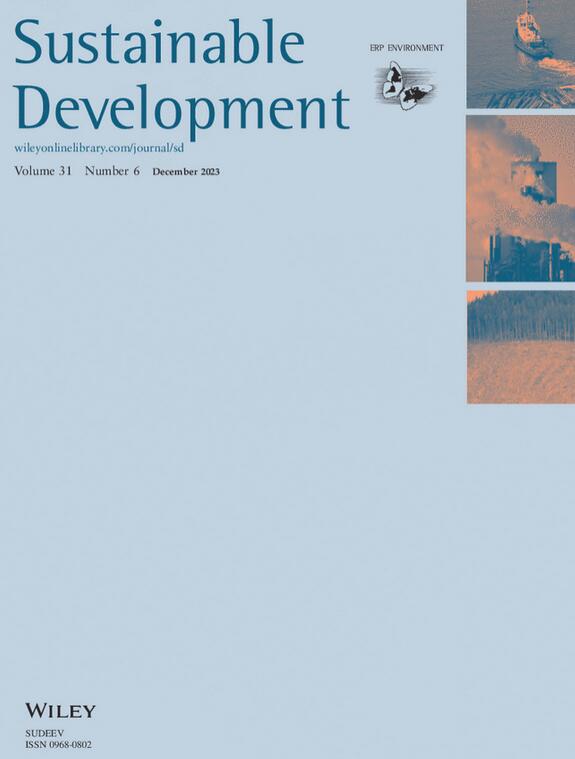An econometric study of eco‐innovation, clean energy, and trade openness toward carbon neutrality and sustainable development in OECD countries
IF 8.2
1区 环境科学与生态学
Q1 DEVELOPMENT STUDIES
引用次数: 0
Abstract
International entities have highlighted the issue of climate change and global efforts toward becoming carbon neutral by 2050. Given the current emphasis on Agenda 2030 and the commitment to achieve net zero emissions, this study lures motivation from the United Nations sustainable development goals (SDGs) of access to affordable clean energy, innovation, sustainable economic growth, sustainable consumption, and production to avert climate change. To this end, this study assesses the role of eco‐innovation, clean energy, trade openness, human capital, and economic growth toward carbon neutrality and sustainable development in Economic Cooperation and Development (OECD) countries. The study utilized regression models to analyze the relationship between the variables. The study findings show that eco‐innovation, clean energy utilization, and human capital have a negative impact on CO2 emissions. Trade openness and economic growth have a positive impact on CO2 emissions except that trade impact is insignificant. The results of the causality test show bidirectional causality between eco‐innovation, energy utilization, trade openness, and CO2 emissions as well as a one‐way causality from trade and economic growth to CO2 emissions. Moreover, the impulse‐response and variance decomposition analysis results show that human capital and clean energy will be the key drivers contributing to the reduction of carbon emissions in the future while eco‐innovation, trade openness, and economic growth will steadily increase CO2 emissions. The study proposes expanded development of eco‐innovation and utilization of clean energy sources to curtail CO2 emissions and achieve SDGs.对经合组织国家的生态创新、清洁能源和贸易开放度进行计量经济学研究,以实现碳中和与可持续发展
国际实体强调了气候变化问题以及全球为在 2050 年前实现碳中和所做的努力。鉴于当前对《2030 年议程》和实现净零排放承诺的重视,本研究从联合国可持续发展目标(SDGs)中汲取动力,即获取负担得起的清洁能源、创新、可持续经济增长、可持续消费和生产,以避免气候变化。为此,本研究评估了经济合作与发展组织(OECD)国家的生态创新、清洁能源、贸易开放度、人力资本和经济增长对实现碳中和与可持续发展的作用。研究利用回归模型分析了变量之间的关系。研究结果表明,生态创新、清洁能源利用和人力资本对二氧化碳排放有负面影响。除贸易影响不显著外,贸易开放度和经济增长对二氧化碳排放有积极影响。因果关系检验结果显示,生态创新、能源利用、贸易开放度与二氧化碳排放之间存在双向因果关系,贸易和经济增长与二氧化碳排放之间存在单向因果关系。此外,脉冲响应和方差分解分析结果表明,人力资本和清洁能源将成为未来碳减排的主要驱动力,而生态创新、贸易开放和经济增长将稳步增加二氧化碳排放量。研究建议扩大生态创新的发展和清洁能源的利用,以减少二氧化碳排放,实现可持续发展目标。
本文章由计算机程序翻译,如有差异,请以英文原文为准。
求助全文
约1分钟内获得全文
求助全文
来源期刊

Sustainable Development
Multiple-
CiteScore
17.30
自引率
11.20%
发文量
168
期刊介绍:
Sustainable Development is a publication that takes an interdisciplinary approach to explore and propose strategies for achieving sustainable development. Our aim is to discuss and address the challenges associated with sustainable development and the Sustainable Development Goals. All submissions are subjected to a thorough review process to ensure that our readers receive valuable and original content of the highest caliber.
 求助内容:
求助内容: 应助结果提醒方式:
应助结果提醒方式:


